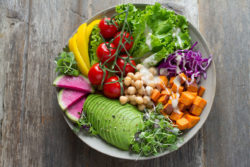
Dr. Madda’s Optimal Diet Tips
Diet Recommendations for Optimal Health, Weight Management and Loss
 There are many ways of eating (diets) that work for different people: low carb, high fat, paleo, ketogenic, etc. Below are suggestions proven to be effective to preserve lean mass while encouraging fat burning and detoxification. Working with the diet is something we touch on with every patient at The Natural Path.
There are many ways of eating (diets) that work for different people: low carb, high fat, paleo, ketogenic, etc. Below are suggestions proven to be effective to preserve lean mass while encouraging fat burning and detoxification. Working with the diet is something we touch on with every patient at The Natural Path.
If you feel great and you are happy with your body composition, great work! Continue with what you’re doing!
I generally suggest as Michael Pollan says, “eat food, not too much, mostly plants (vegetables).” I love this!
A few general rules to live by with food:
-
Eat when hungry and only when hungry.
-
Stop when satiated, there is never any reason to overfill our digestive system
-
Chew your food thoroughly and eat mindfully.
-
Choose organic foods that are high in nutrients.
-
Make a commitment to eating well 90% of the time in your life! It’s worth it!
Fruits and Vegetables
Fruits and vegetables are the most nutrient dense foods around. They can also be very satiating and aside from high sugar fruits and starchy vegetables you can feel great about loading up your plate! All produce …from a juicy pear to a crispy bunch of red lettuce is packed with water, fiber and nutrients.
Although local, seasonal produce has a higher nutritional value … dried canned, and frozen fruits/vegetables are usually picked just before peak ripeness and packaged within a few hours.
Choose a wide variety of colors and textures with your vegetables to guarantee a variety of vitamins, minerals and nutrients! There are so many ways to prepare vegetables … roasted, grilled, raw, steamed or pureed. Be moderate with your intake of starchy vegetables (i.e. potatoes, beans, corn, peas, squash, etc.) as these have a high carbohydrate content and can increase blood sugar and insulin. Colorful vegetables are loaded with polyphenols and antioxidants that benefit blood vasculature and detoxification pathways.
Proteins
I suggest getting 40 to 80 grams daily. We have to also remember that the squamous cells lining the entire gastrointestinal tract shed every few days and the amino acids are recycled and utilized by the body. High protein diets create an acidic environment in the body and challenge kidney function.
If eating meat/fish, please choose clean, organic sources and opt for 3 to 6 ounces per serving. In general, 1-2 servings daily is plenty. For those who follow a plant based diet, I recommend organic eggs, Greek yogurt, sesame seeds, hemp seeds, chia seeds, organic nuts, tofu (non-GMO) and tempeh as protein options.
Fats
Use high-quality organic oils. Consider MCT, coconut, olive, grapeseed, sunflower and avocado oil. Try to choose oils in dark, glass jars that protect from oxidation. Oils go well with salads and veggie dishes. Nuts, although often given a healthy stamp of approval have a carb content and a significant amount of fat and can be difficult to digest. Eat nuts in limited quantities and remember 10-12 nuts is considered a serving.
Carbohydrates
In general, my recommendation is to limit simple carbohydrates (i.e. grains, bread, chips, cereals, processed/prepackaged food, bars and high sugar foods). These will increase the blood sugar quickly and create fat storage. While certain carbs like fruits, legumes, quinoa, and some grains can be healthy alternatives to the above we can actually get all of the carbs we need from VEGETABLES!
A typical day for me…
I use organic, cream in my coffee with 1 tsp of raw sugar. I eat a 95% plant based diet and eat very little meat/fish. I eat lots of hemp seeds, chia seeds and sesame seeds (tahini). I use a plant based, clean protein powder called Sunwarrior for additional amino acids/protein. My smoothie also known as the “power breakfast” is something I have at least 4- 5 days per week. I also consume lots of fresh, organic vegetables either steamed, in a salad or wrapped in a gluten free tortilla or nori seaweed sheet.
On occasion, I do eat some nuts (organic, raw – almonds, macadamias, cashews), as well as the occasional rice and legume dish. For flavor, I season my meals with tahini, Tabasco, and my favorite sauce Karam’s tahini and/or garlic sauce.
Intermittent Fasting (I.F.)
This is perhaps the most important concept of all. I suggest that all of my patients learn the benefits of intermittent fasting and make this a non-negotiable part of daily life. I.F. simply implies choosing a 6-8 hour eating window each day and fasting for 16-18 hours. I.F. allows your body to burn through your glucose and glycogen stores and then begin to burn fat stores on a daily basis. This alone can convert your body into a fat burning machine! I.F. creates metabolic flexibility and gives your body the ability to go long periods between eating without hunger. Intermittent fasting also encourages detoxification and stem cell activation. The benefits are too many to list. Dr. Joseph Mercola explains this well in his book, “KetoFast.” I highly recommend this book or audio-book.
It is also advisable to avoid eating for 2 to 3 hours before bed. This is vital and allows your body to heal and revitalize instead of working to digest and assimilate food all night long!
Exercise
Exercise is vital to living in a healthy body! If possible, try to get 10-20 minutes of exercise daily (ideally in the morning). Exercise will increase your ability to burn fat all day long! The rebounder is my personal favorite form of exercise. It’s fun, easy on the body and provides a whole body workout. You can find a high quality rebounder on Amazon, I suggest the Jumpsport 250 Pro for $250.
Tags: diet advice portand, eating well, HCG Diet Oregon, hcg diet portland, hcg diet SE Portland, naturopathic diet, optimal diet, weight loss diet
Categories: Anti Aging Therapies, Body Composition, Eating Well, Food Information, General Wellness, Intermittent Fasting, Weight Loss
